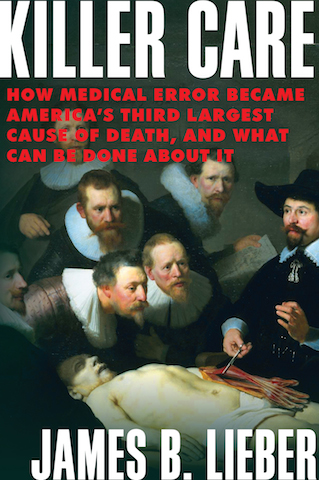Institute of Medicine (IOM)
See the following -
IOM Report Defense/VA Have No Clue if $9.3 Billion Worth Of PTSD Treatment Works
The Defense and Veterans Affairs departments spent $9.3 billion to treat post-traumatic stress disorder from 2010 through 2012, but neither knows whether this staggering sum resulted in effective or adequate care, the Institute of Medicine reported today....
- Login to post comments
IOM: No More DoD-VA Integrated Medical Centers Until iEHR
Additional integrated health centers along the lines of the James A. Lovell Federal Health Care Center in North Chicago, Ill., shouldn't be undertaken by the departments of Defense and Veterans Affairs until they stand up an interoperable electronic health records system, says the Institute of Medicine. Read More »
- Login to post comments
Killer Care: How Medical Error Became America's Third Largest Cause of Death, And What Can Be Done About It
 ...The following year, researchers shook the profession with an article in Health Affairs entitled “‘Global Trigger Tool’ Shows that Adverse Events in Hospitals May be Ten Times Greater than Previously Measured.” Dr. David Classen, who did the seminal research for global triggers, served as lead author of the study, which looked at three mid-size to large (ranging from 550 to 1,000 beds) teaching hospitals associated with medical schools in the West and Northwest that participated on the condition of anonymity...When different detection methods were applied, global triggers found over 90 percent of events, the government’s Patient Safety Indicators (based on discharge summaries) found 8.5 percent, and voluntary reporting disclosed only 2 percent (afraid of censure and malpractice, doctors and nurses seldom willingly self-accuse). Classen, et al. warned: “reliance on voluntary reporting and the Patient Safety Indicators could produce misleading conclusions about the current safety of care in the U.S. health-care system and misdirect efforts to improve patient safety.”...
...The following year, researchers shook the profession with an article in Health Affairs entitled “‘Global Trigger Tool’ Shows that Adverse Events in Hospitals May be Ten Times Greater than Previously Measured.” Dr. David Classen, who did the seminal research for global triggers, served as lead author of the study, which looked at three mid-size to large (ranging from 550 to 1,000 beds) teaching hospitals associated with medical schools in the West and Northwest that participated on the condition of anonymity...When different detection methods were applied, global triggers found over 90 percent of events, the government’s Patient Safety Indicators (based on discharge summaries) found 8.5 percent, and voluntary reporting disclosed only 2 percent (afraid of censure and malpractice, doctors and nurses seldom willingly self-accuse). Classen, et al. warned: “reliance on voluntary reporting and the Patient Safety Indicators could produce misleading conclusions about the current safety of care in the U.S. health-care system and misdirect efforts to improve patient safety.”...
Latest ECRI Institute Report Names Top 10 Hospital Technology Issues
The Emergency Care Research Institute (ECRI) is a nonprofit organization dedicated to bringing applied scientific research to enable improvement of patient care. The organization is a designated Evidence-Based Practice Center by the U.S. Agency for Healthcare Research and Quality and listed as a federal Patient Safety Organization by HHS... Read More »
- Login to post comments
Living Sick And Dying Young In Rich America
Chronic illness is the new first-world problem. Read More »
- Login to post comments
Mostashari Assures Patient Safety Plan Sooner than 12 Months
Dr. Farzad Mostashari, the national health IT coordinator, said that agencies in the Health and Human Services Department will work closely to craft a surveillance and action plan to keep patients safer through health IT, and it will be done sooner than called for by the Institute of Medicine. Read More »
- Login to post comments
NIH And VA Address Pain And Related Conditions In U.S. Military Personnel, Veterans, And Their Families
Thirteen research projects totaling approximately $21.7 million over 5 years will explore nondrug approaches to managing pain and related health conditions such as post-traumatic stress disorder (PTSD), drug abuse, and sleep issues. The effort seeks to enhance options for the management of pain and associated problems in U.S. military personnel, veterans, and their families...
- Login to post comments
On the Financial Conflicts of Interests of Medical Societies and Rising Drug Prices
 The notion that health care prices are high and are rising continuously in the US should hardly be novel...We first posted about high drug prices in July, 2005, with the example of BilDil...But only a few days later we noted that three cancer costs had yearly costs in the five figures, and one, Erbitux, cost as much as $100,000. Most amazingly we noted that Thalidomid was priced at $25,000 a year...Since then, the ridiculously high prices of many tests and treatments, but most notably new drugs and devices, has been so widely covered, our discussion has been limited to special cases.,,
The notion that health care prices are high and are rising continuously in the US should hardly be novel...We first posted about high drug prices in July, 2005, with the example of BilDil...But only a few days later we noted that three cancer costs had yearly costs in the five figures, and one, Erbitux, cost as much as $100,000. Most amazingly we noted that Thalidomid was priced at $25,000 a year...Since then, the ridiculously high prices of many tests and treatments, but most notably new drugs and devices, has been so widely covered, our discussion has been limited to special cases.,,
- Login to post comments
ONC Plan Makes Reporting IT Hazards Easy
With sights set on utilizing health IT to curb the alarming number of medical errors that transpire each year, ONC officials unveiled Tuesday their final plan to bolster patient safety initiatives nationwide. Read More »
- Login to post comments
ONC Plans Stronger EHR, Patient Safety Features
The Office of the National Coordinator for Health IT wants to use electronic health record certification criteria to make it easier for physicians to report patient safety events, which provide critical raw data for developers, healthcare providers, researchers and policymakers to improve the safety of health IT and make care safer. Read More »
- Login to post comments
Open Source and EHRs: A proven reality and invaluable opportunity
The marriage between open source technology and electronic health records is at first blush, greeted by many with skepticism regarding robustness and efficacy. In truth, persistent myths obscure an intriguing reality: Open source EHR systems are not only possible but already in place. Read More »
- Login to post comments
Open Source Electronic Health Records For Education And Training
 In spite of being very involved in the field of Health Informatics I only recently became aware of VistA for Education (VFE), which has all of the aforementioned attributes of an excellent solution for EHR education purposes. VFE was developed as a result of a grant from the Office of the National Coordinator (ONC) to supplement the ONC Health Information Technology (HIT) curriculum. Electronic health records (EHRs) are more than just the electronic equivalent of paper-based health records. Electronic health data is easier to search, share and archive, compared to paper records. Additionally, EHRs can be embedded with clinical decision support to alert and remind physicians of patient safety and preventive medicine measures.
In spite of being very involved in the field of Health Informatics I only recently became aware of VistA for Education (VFE), which has all of the aforementioned attributes of an excellent solution for EHR education purposes. VFE was developed as a result of a grant from the Office of the National Coordinator (ONC) to supplement the ONC Health Information Technology (HIT) curriculum. Electronic health records (EHRs) are more than just the electronic equivalent of paper-based health records. Electronic health data is easier to search, share and archive, compared to paper records. Additionally, EHRs can be embedded with clinical decision support to alert and remind physicians of patient safety and preventive medicine measures.
Panel Emphasizes Safety in Digitization of Health Records
Poorly designed, hard-to-use computerized health records are a threat to patient safety, and an independent agency should be set up to investigate injuries and deaths linked to health information technology, according to a federal study released Tuesday. Read More »
- Login to post comments
Phillip Longman's Senate Testimony Before the The State of VA Health Care Hearings
We need to open up the VA and grow it, extending no-questions-asked eligibility not only to all vets but to their family members as well. This not only makes clinical sense, it also makes economic sense. So long as the VA remains one of, if not the most, cost- effective, scientifically driven, integrated health care delivery systems in the country, the more patients it treats, the better for everyone.
- Login to post comments
Precision Medicine, Blue Button Among White House Big Data Efforts
 Precision medicine, medical research, and improved patient engagement through initiatives like Blue Button are among the highlight achievements of the Obama Administration’s emphasis on data transparency and information sharing, says a White House fact sheet celebrating the nation’s big data progress. The following is a rundown of some of the specific open-data health efforts of the Obama Administration...
Precision medicine, medical research, and improved patient engagement through initiatives like Blue Button are among the highlight achievements of the Obama Administration’s emphasis on data transparency and information sharing, says a White House fact sheet celebrating the nation’s big data progress. The following is a rundown of some of the specific open-data health efforts of the Obama Administration...
- Login to post comments